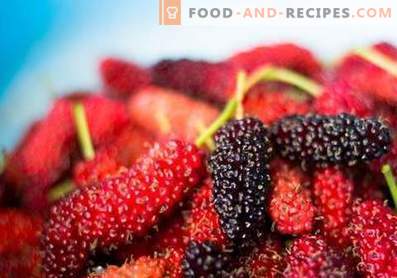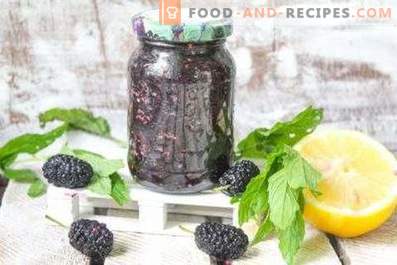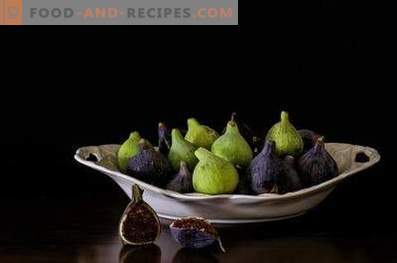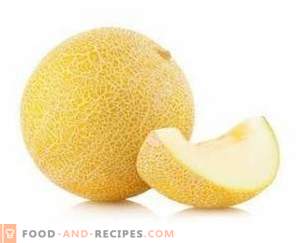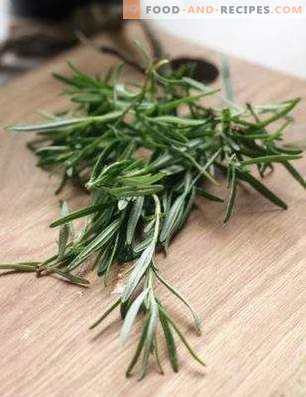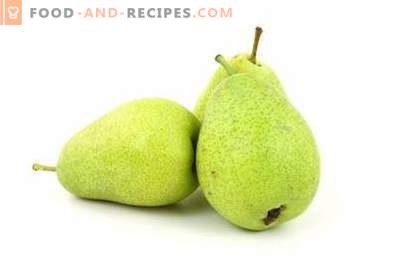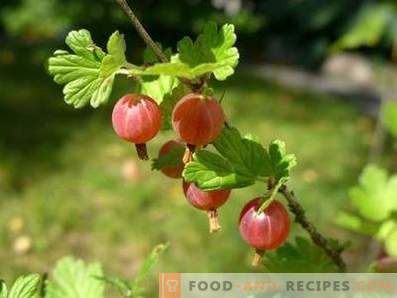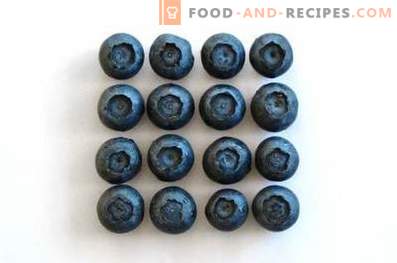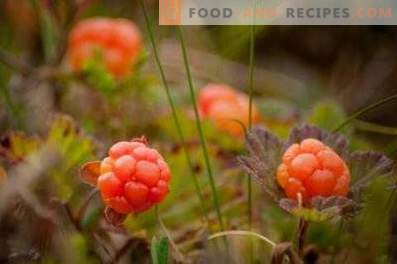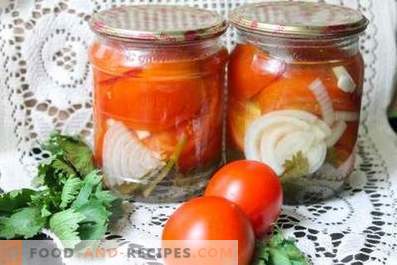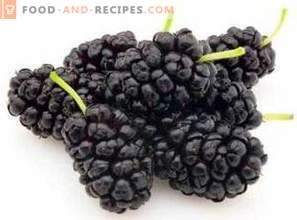
The mulberry tree, or mulberry tree, is a tree of the Mulberry family. The homeland of this plant is considered to be the territories of South-West Asia: it has been proved that the locals have been cultivating mulberry trees for several thousand years to get their tasty, nutritious and healthy fruits. Nowadays, representatives of this genus grow in most countries of Africa, North America and Asia, which have a subtropical or moderately warm climate.
Mulberry is a tree with a large lush crown, reaching a height of 13-14 meters. The next, downy green leaves of the plant have a heart-shaped form and a jagged edge. The flowering of the mulberry tree begins at the end of May. Flowers of the plant have a pale yellow, light pink or white color and have a distant resemblance to the fruits of blackberry. Mulberry berry is a fleshy multicyote of plum, white or burgundy in color with a pleasant fruity aroma and a sour-sweet taste.
Mulberry berries are a valuable food used in cooking for making confectionery (jams, sorbet, preserves, pastila, fillings for pies, sweets) and alcoholic beverages (wines, vodka). The silkworm caterpillars are grown on thin shoots and leaves of the mulberry tree, and the wood of this plant is used in the woodworking industry for making musical instruments and original souvenirs. In addition, all parts of the mulberry tree are used in traditional medicine to combat various types of disorders in the body.
Unfortunately, the picked fruits of mulberry can not be stored in the refrigerator for more than four days. For this reason, berries collected from the mulberry tree are not suitable for long-term transportation. Meanwhile, they fully retain their healing properties after freezing and drying. This allows the use of mulberry for culinary and medicinal purposes away from the places of cultivation, as well as to harvest berries for future use.
Nutritional value of mulberry and vitamins in its composition
The fruits of mulberry are rightly considered the richest source of biologically significant compounds.
Nutritional value of mulberry (100 g):
- 12, 667 g of carbohydrates;
- 0, 681 g of proteins;
- 1, 514 g of fiber;
- 1, 114 g of organic acids;
- 0, 864 g of ash;
- 11, 799 g of monosaccharides, disaccharides;
- 82, 666 g of water.
Vitamins per 100 g of mulberry:
- 0, 019 mg of beta-carotene;
- 0, 019 mg of riboflavin (B2);
- 3, 307 µg of retinol equivalent (A);
- 0, 908 mg of niacin equivalent;
- 9, 908 mg of ascorbic acid (C);
- 0, 038 mg of thiamine (B1);
- 0, 718 mg of vitamin PP.
Energy value of mulberry
Sweet mulberry fruits have a rather low energy value. This allows you to use them as a low-calorie dessert with diets aimed at getting rid of excess weight.
- Caloric value of 100 g of mulberry fruits - 50, 309 kcal.
- The caloric content of a medium-sized mulberry fruit (3 g) is 1, 509 kcal.
- The caloric content of dried mulberries is 324, 098 kcal.
- Calories of mulberry jam - 247, 814 kcal.
- Calories in mulberry wine - 81, 213 kcal.
Useful elements in mulberry fruits
Mulberries are a food source of beneficial macronutrients, iron and zinc for the human body.
Trace elements in the composition of mulberry (per 100 g):
- 0, 119 mg of zinc;
- 1, 794 mg of iron.
Macroelements in the composition of mulberry (per 100 g):
- 23, 901 mg of calcium;
- 15, 574 mg of sodium;
- 37, 816 mg of phosphorus;
- 52, 106 mg of magnesium;
- 348, 714 mg of potassium.
Useful properties of mulberry fruits
- The unripe, green fruits of the mulberry tree are characterized by pronounced astringent properties. In alternative medicine they are used in the treatment of diarrhea. Conversely, well-ripened mulberries have a laxative effect. Traditional healers use them as an effective means of dealing with chronic constipation.
- Ripe mulberry has a pronounced diuretic effect. Drinks prepared on its basis, are useful for edema.
- Red and dark purple mulberry fruits contain substances that positively affect the functioning of the blood system. That is why berries with such color are recommended to include in the diet of persons suffering from anemia.
- A decoction of the fruits of mulberry gargle with a cold. In addition, this tool is used to reduce the unpleasant symptoms of dental diseases, accompanied by the development of inflammatory processes in the oral cavity.
- Fresh juice squeezed from white mulberry is recognized as an effective means of preventing rickets in children. For the same purpose, use bekmes (fruit honey from condensed berries juice) or dried plant fruits.
- Mulberry berries contain beneficial compounds that normalize the reproductive system. For men, meals and drinks prepared on the basis of these sweet and nutritious berries help to avoid impotence and inflammation of the prostate, and for women to minimize the risk of uterine bleeding and alleviate the unpleasant symptoms accompanying the onset of menopausal syndrome.
- According to cardiologists, mulberry is useful for people suffering from myocardiodystrophy and heart disease. It has been established that regular inclusion of berries in the diet of this plant helps to eliminate shortness of breath, alleviate heart pains accompanying the development of these pathologies, as well as normalize heart rhythm. The substances contained in mulberry help prevent the development of atherosclerosis and other cardiac diseases.
- Substances contained in well-matured mulberry fruits help to cope with overwork, nervous breakdowns and insomnia. In folk medicine, a decoction of the berries of the mulberry tree with honey is used to combat the above pathologies. To prepare it, a kilogram of mulberry fruits is poured with 650 ml of water and boiled until the mixture becomes almost homogeneous and acquires a thick, viscous consistency. Add 280 g of liquid honey to the resulting mass. The drug is taken at 10 g per day, dividing the dose into 2 divided doses.
- Fresh mulberry juice is used to treat diseases of the respiratory tract, taking it as an expectorant and anti-inflammatory agent. In addition, a healing drink from the fruits of mulberry tree helps to cope with a protracted unproductive cough.
- In Chinese alternative medicine, mulberry juice is used as an effective antipyretic and diaphoretic in feverish conditions.
- Mulberry is an effective medicine for hypertension. The dry fruits of this plant are combined with peppermint leaves (1: 1) and are prepared on the basis of a weak broth. The resulting drink is drunk instead of tea, the daily dose is 650 ml.
- Mulberry fruit pulp is an effective means for strengthening hair follicles, improving hair structure and accelerating their growth, as well as for combating dandruff manifestations. On its basis, a mask is prepared, which is applied to the hair for 3-7 hours, and then carefully washed off with warm water.
Useful properties of bark, leaves and roots of mulberry
- There are substances with wound-healing properties in the bark of mulberry. That is why it is used to prepare an ointment that promotes rapid tightening of scratches and other skin damage (dried bark powder is combined with vegetable oil, 1:25).
- With the help of the bark of a mulberry tree, a protracted cough can be cured. To do this, you need to prepare a weak broth based on it and drink the resulting drink at 350 ml per day.
- Mulberry leaves contain antipyretic compounds. In order to bring down the temperature, it is enough daily (for 1-3 days) to drink a glass of weak broth prepared on their basis.
- Infusion of the roots of a mulberry tree (a teaspoon of medicinal raw materials per cup of boiling water) is an effective remedy for intestinal and stomach pains. The medicine is taken 30 ml per day, dividing the daily dose into several doses.
Damage to mulberry and contraindications to its consumption
- Mulberry fruits are a potential allergen. For this reason, the main contraindication to eating mulberry trees for food is individual intolerance and an increased tendency to develop allergic reactions.
- Dark purple and burgundy mulberry fruits contain a lot of sugars (11-12%). For this reason, doctors recommend that people suffering from diabetes limit the consumption of berries of this plant.
- Abuse of mulberry fruits can cause diarrhea.
- Nutritionists do not recommend drinking cold water on mulberry trees: this leads to bloating and flatulence.
- Persons suffering from hypertension should refuse to eat large quantities of mulberry fruit. It is established that the abuse of the berries of this plant (especially in the heat) can provoke a sharp increase in blood pressure.
